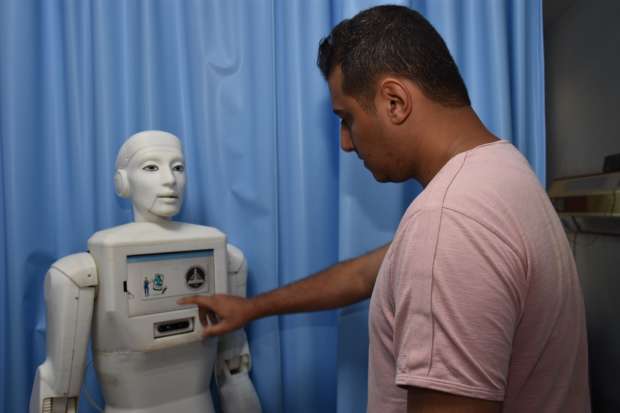With the exceptionally severe circumstances imposed by the Coronavirus pandemic on the world, a research team from Ain Shams University in Egypt thought of an innovation that would help the healthcare sector perform its tasks in a way that limits the spread of the pandemic inside hospitals and follows the preventive measures.
For nearly a year, a team from the Faculty of Computer science and Information systems worked on the innovation recently revealed by Ain Shams University, which is a robotic nurse in order to reduce human communication between the physician, nurse, and the infected patient.
And inside Ain Shams Specialized Hospital, media lenses witnessed – last week – the testing of the first nursing robot that performs nursing tasks in Egypt, which was called “Shams”.
The Dean of the faculty of Computer science and Information systems, Najwa Badr, explained that the new robotic nurse can recognize the faces of patients or doctors, and enter data on the health status of each patient, and can also save places inside the hospital.
She added – during a press conference – that the robotic nurse speaks Arabic, and can deliver the samples needed for analysis to the lab, measure the patient’s blood pressure and temperature, and bring medication from the pharmacy and give it to the patient.
In addition, you can communicate between the patient and the treating physician through the video call feature, and perform sterilization operations inside the hospital.
Robotic Nurse Fully Made in Egypt
For his part, Director of Ain Shams Specialized Hospital, Walid Anwar, confirmed that the manufacture of the robotic nurse was done with purely Egyptian funding and supervision, pointing to the preparation of a plan to open a production line for the robotic nurse, during the coming period to help the healthcare sector.
He added, during a telephone interview on the “This Morning” program, broadcast on the “Extra News” satellite channel, that the robotic nurse can take voice commands to communicate with the patient.
He continued, “The patient can talk with the robotic nurse, and the physician can give her orders, and she can identify places and get specific medicines.” Despite the multifunctionality of the robotic nurse, it cannot draw a blood sample from patients, according to Anwar’s assertion.
And about the reactions inside the healthcare facility after the robotic nurse was tested, the director of Ain Shams Hospital confirmed that there was a state of fascination among the medical staff, and he added, “As for the patients, they were surprised at the beginning because it was new to them.”
In the same context, the head of the research team that manufactured the first robotic nurse, Israa Tariq, commented, saying that the robot aims to intervene quickly if there is any danger to the patient when contacting the physician and vice versa.
She explained that the most important feature of the new invention is its ability to speak and understand the Egyptian colloquial dialect, which will make it easier for patients who find it difficult to speak Standard Arabic.
She added that the cost of the project did not exceed 200,000 pounds, equivalent to 13,000 dollars.
Shams is Not the First Robotic Nurse Innovated by Egypt
“Shams” is the first innovation of its kind in Egypt to be produced by a research team affiliated with a scientific institution, but there are other individual efforts that preceded it.
Last June, Egyptian engineer Mahmoud El-Komy got the prize of the International Exhibition of Inventions of Geneva for the year 2021, for inventing a robot capable of diagnosing some diseases and withdrawing a laboratory swab for the Coronavirus in order to reduce friction between patients and medical staff.

The robot, called “Kira”, can measure patients’ vital functions such as pressure, diabetes and temperature, perform medical x-rays, and even prepare reports on the disease’s condition.
Al-Koumi explained – in press statements – that “Kira” can deal with about 85 diseases, including the entire cancer family, indicating its ability to expand in dealing with more diseases over time.
“This type of robots can be developed by what is called deep learning algorithms of artificial intelligence, similar to the experience gained by a human doctor, where the robot gets to experience through trial and error and error correction,” he added.

